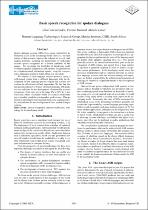JavaScript is disabled for your browser. Some features of this site may not work without it.
- ResearchSpace
- →
- Research Publications/Outputs
- →
- Conference Publications
- →
- View Item
| dc.contributor.author |
Van Heerden, C

|
|
| dc.contributor.author |
Barnard, E

|
|
| dc.contributor.author |
Davel, M

|
|
| dc.date.accessioned | 2009-10-12T08:32:14Z | |
| dc.date.available | 2009-10-12T08:32:14Z | |
| dc.date.issued | 2009-09 | |
| dc.identifier.citation | Van Heerden, C, Barnard, E and Davel, M. 2009. Basic speech recognition for spoken dialogues. 10th Annual Conference of the International Speech Communication Association (Interspeech 2009). Brighton, UK, 6-10 September, 2009. pp 3003-3006 | en |
| dc.identifier.issn | 1990-9772 | |
| dc.identifier.uri | http://hdl.handle.net/10204/3649 | |
| dc.description | 10th Annual Conference of the International Speech Communication Association (Interspeech 2009). Brighton, UK, 6-10 September 2009 | en |
| dc.description.abstract | Spoken dialogue systems (SDSs) have great potential for information access in the developing world. However, the realisation of that potential requires the solution of several challenging problems, including the development of sufficiently accurate speech recognisers for a diverse multitude of languages. The paper investigates the feasibility of developing small-vocabulary speaker-independent ASR systems designed for use in a telephone-based information system, using ten resource-scarce languages spoken in South Africa as a case study. The researchers contrast a cross-language transfer approach (using a well-trained system from a different language) with the development of new language-specific corpora and systems, and evaluate the effectiveness of both approaches. It was found that limited speech corpora (3 to 8 hours of data from around 200 speakers) are sufficient for the development of reasonably accurate recognisers. Error rates are in the range 2% to 12% for a tenword task, where vocabulary words are excluded from training to simulate vocabulary-independent performance. This approach is substantially more accurate than cross-language transfer, and sufficient for the development of basic spoken dialogue systems. | en |
| dc.language.iso | en | en |
| dc.publisher | International Speech Communication Association | en |
| dc.subject | Speech recognition | en |
| dc.subject | Spoken dialogue systems | en |
| dc.subject | SDS | en |
| dc.subject | Accurate speech recognisers | en |
| dc.subject | ASR | en |
| dc.subject | Resource scarce languages | en |
| dc.subject | Human language technologies | en |
| dc.subject | Interspeech 2009 | en |
| dc.subject | Speech communication | en |
| dc.subject | Small-vocabulary speaker-independent ASR systems | en |
| dc.subject | Cross-language transfer | en |
| dc.title | Basic speech recognition for spoken dialogues | en |
| dc.type | Conference Presentation | en |
| dc.identifier.apacitation | Van Heerden, C., Barnard, E., & Davel, M. (2009). Basic speech recognition for spoken dialogues. International Speech Communication Association. http://hdl.handle.net/10204/3649 | en_ZA |
| dc.identifier.chicagocitation | Van Heerden, C, E Barnard, and M Davel. "Basic speech recognition for spoken dialogues." (2009): http://hdl.handle.net/10204/3649 | en_ZA |
| dc.identifier.vancouvercitation | Van Heerden C, Barnard E, Davel M, Basic speech recognition for spoken dialogues; International Speech Communication Association; 2009. http://hdl.handle.net/10204/3649 . | en_ZA |
| dc.identifier.ris | TY - Conference Presentation AU - Van Heerden, C AU - Barnard, E AU - Davel, M AB - Spoken dialogue systems (SDSs) have great potential for information access in the developing world. However, the realisation of that potential requires the solution of several challenging problems, including the development of sufficiently accurate speech recognisers for a diverse multitude of languages. The paper investigates the feasibility of developing small-vocabulary speaker-independent ASR systems designed for use in a telephone-based information system, using ten resource-scarce languages spoken in South Africa as a case study. The researchers contrast a cross-language transfer approach (using a well-trained system from a different language) with the development of new language-specific corpora and systems, and evaluate the effectiveness of both approaches. It was found that limited speech corpora (3 to 8 hours of data from around 200 speakers) are sufficient for the development of reasonably accurate recognisers. Error rates are in the range 2% to 12% for a tenword task, where vocabulary words are excluded from training to simulate vocabulary-independent performance. This approach is substantially more accurate than cross-language transfer, and sufficient for the development of basic spoken dialogue systems. DA - 2009-09 DB - ResearchSpace DP - CSIR KW - Speech recognition KW - Spoken dialogue systems KW - SDS KW - Accurate speech recognisers KW - ASR KW - Resource scarce languages KW - Human language technologies KW - Interspeech 2009 KW - Speech communication KW - Small-vocabulary speaker-independent ASR systems KW - Cross-language transfer LK - https://researchspace.csir.co.za PY - 2009 SM - 1990-9772 T1 - Basic speech recognition for spoken dialogues TI - Basic speech recognition for spoken dialogues UR - http://hdl.handle.net/10204/3649 ER - | en_ZA |






